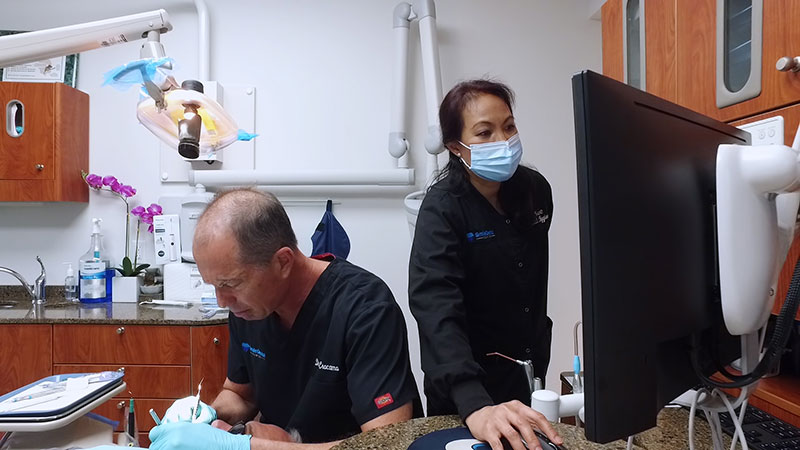Based on recommendations from the American Dental Association, patients should start receiving comprehensive dental exams at age two and schedule them every three years.
The mouth is not an isolated part of the body. Instead, oral health may be the first indicator of other physical concerns. As such, not only will a comprehensive dental exam identify and help address tooth decay and cavities, but it may also point to:
- Cardiovascular issues
- Undiagnosed diabetes
- Sinus issues
- High blood pressure
- Oral cancer
- Immune system issues
- Gum and bone disease
Through an examination of your teeth, tissues and jaw, a dentist may take a look at the following.
Assess Teeth and Gum Health
Even if you feel no pain, your teeth could still be having issues. A dentist identifies any concerns with a gingival and periodontal assessment, looking for gum recession, tartar buildup, bleeding, swelling, tooth alignment, decay, periodontal disease and possible tooth replacement. During this exam, a dentist:
- Measures the pocket depth of each tooth.
- Checks for bone loss and tooth mobility.
- Evaluates the patient’s occlusion (bite) and jaw, which may indicate crowded, crooked or poorly spaced teeth, an overbite or open bite.
- Checks for teeth position, decay, cavities and impaction.
- May remove stains or deposits from your teeth, before thoroughly cleaning them.
- Offers lessons in oral hygiene, including proper brushing and flossing techniques.
- Takes a dental impression.
- Examines dental implants and restorations, if present.
- Reviews any medications to determine if they could be negatively impacting oral health.
Look for Oral Cancer
While smokers have a higher risk, all individuals need to be screened for oral cancer. One of our dentists will look at and feel the cheeks, palate, gums, lips, floor of the mouth, tongue, jaw, frenums, behind the molars and sides of the neck for potential signs. Your lymph nodes, under the neck, chin and ears, may also be examined. During this stage, a dentist checks for flexibility, any tenderness and pain.
Perform a Series of X-Rays
Not every abnormality is visible. For a fuller picture, an X-ray may be requested to examine each tooth and supporting structures in more detail.
Check for TMJ
While further evaluating the jaw and bite strength, dentists will also check for temporomandibular joint dysfunction (TMJ). Generally, pain around the jaw, chewing issues and challenges when opening the mouth all point to a potential diagnosis.
After the assessment, an appropriate treatment plan will be designed to address urgent and long-term oral care. A follow-up visit or other procedures may be recommended.
Are you experiencing pain following a recent dental exam? Don’t wait. We see emergencies same day!

